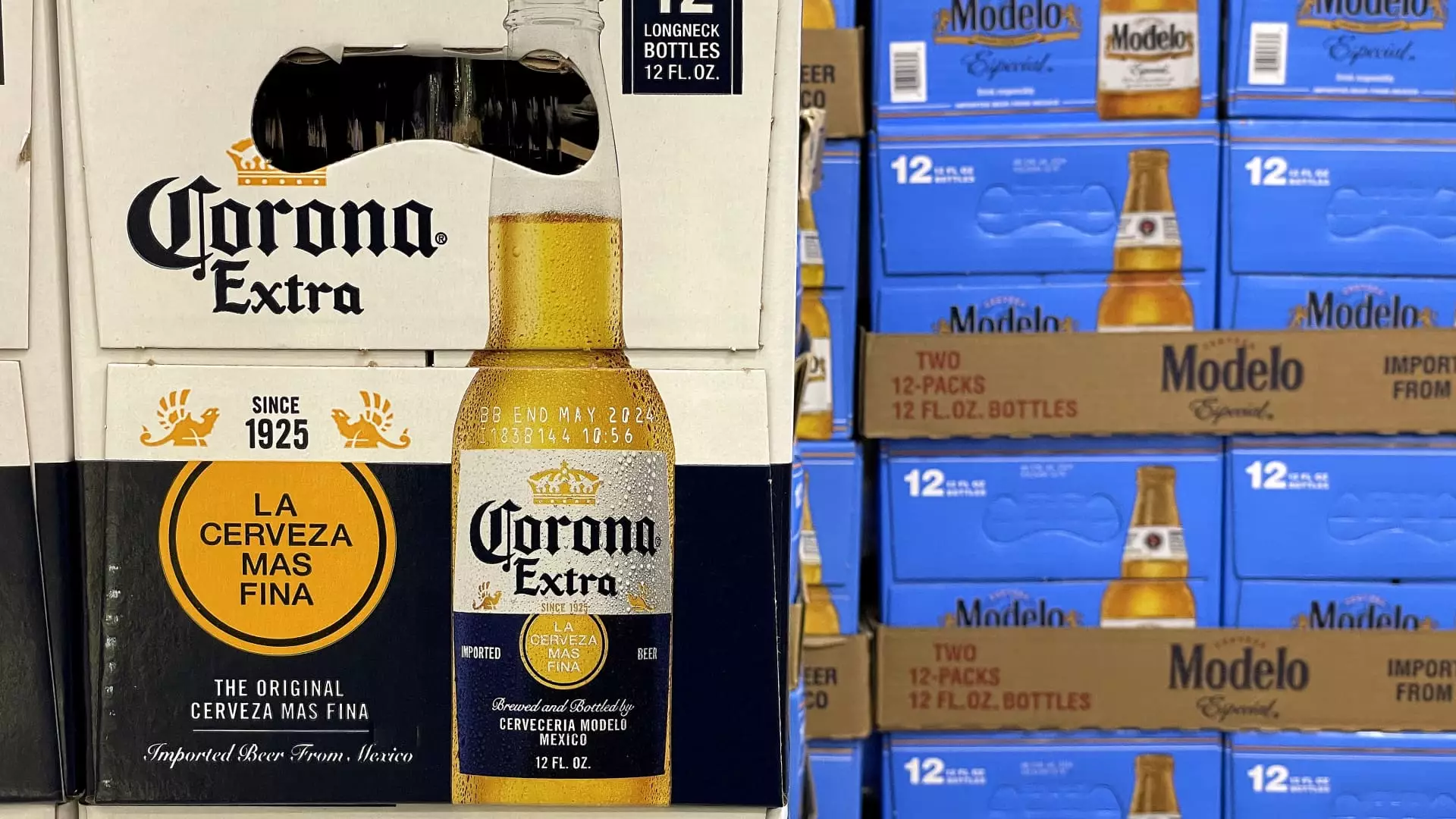Constellation Brands, a major player in the alcohol industry known for its extensive portfolio of beer, wine, and spirits, has recently unveiled quarterly earnings that have underwhelmed both analysts and investors alike. The company’s latest report raises pertinent questions about its growth trajectory, particularly as it grapples with market dynamics that are rapidly changing. This article will analyze the financial performance of Constellation Brands, the implications of its results, and the broader trends impacting its business model.
In the three months ending November 30, Constellation Brands reported net sales of $2.46 billion, which was disappointing as it fell short of analysts’ expectations of $2.53 billion. The financial results have prompted serious scrutiny regarding the effectiveness of the company’s strategy. Although adjusted earnings per share (EPS) managed to stay relatively stable at $3.25, this was just a penny shy of the previous year and less than the anticipated $3.31.
Unfavorable comparisons with prior quarters are also evident in the company’s key segments. The wine and spirits division saw a staggering 14% decline in sales year over year, a stark contrast to the anticipated performance and indicating potential underlying issues with consumer demand and brand resonance. Conversely, while the beer segment showed some growth—3% year-over-year—the performance was still below what the market had hoped to see.
Market Observations: Changing Consumer Preferences
Several factors may be undermining demand for alcoholic beverages as a whole. For instance, reports indicate a growing inclination among younger consumers toward cannabis-based options and weight loss alternatives such as GLP-1 medications, which could be contributing to the decline in alcohol consumption. This strategic shift among consumers represents a fundamental challenge for traditional alcohol brands, including those under the Constellation umbrella.
The wavering demand reflects broader trends that could threaten Constellation’s beer revenues as well. While the company’s beer brands, including Modelo and Corona, have historically served as growth engines, recent reports indicate that they too are feeling the effects of market headwinds. This realization casts doubt on the effectiveness of the company’s long-standing reliance on these brands for growth.
The management of Constellation Brands seems aware that adjustments need to be made. Following disappointing quarterly results, several changes have been proposed, including a renewed focus on the beer sector while divesting from the underperforming spirits and wine divisions. The aim is to streamline operations and concentrate resources on the segments that provide the highest growth potential. However, the question remains whether these measures will be enough to regain investor confidence.
Furthermore, Constellation recently downgraded its sales forecasts for the upcoming fiscal year. Projected sales growth has been trimmed from an optimistic 4% to 6% down to a more subdued estimate of 2% to 5%. Similarly, the guidance for the combined performance of wine and spirits is particularly concerning, with projected declines suggesting that these units will continue to detract from overall profitability.
Investor Sentiment: Reaction to Market Conditions
As a result of the disappointing quarterly performance coupled with troubling market forecasts, investor sentiment toward Constellation Brands has soured. With shares experiencing a notable single-session downturn of over 16%, confidence in the stock has eroded. The company is now facing immense pressure to turn its fortunes around, and the likelihood of exiting the investment is on the table for many.
The downward revision of price targets—from $300 to $240—reflects an acknowledgment of the rapidly changing market conditions. Additionally, the focus on the potential to unlock shareholder value through separation of the wine and spirits segment has not alleviated the concerns surrounding the company’s ability to grow its beer business in the current environment.
Constellation Brands finds itself at a crossroads. While the company still holds a significant place in the beverage industry, the latest financial results highlight critical challenges that may hinder future growth. With consumer preferences shifting and a host of external pressures, the once-stable brand could no longer sustain itself on legacy sales alone.
As management re-evaluates its priorities and attempts to navigate this tumultuous landscape, investors must weigh the risks and potential rewards of remaining engaged with the company’s stock. The reality is clear: Constellation Brands must adapt quickly to survive in a rapidly evolving market. Failure to do so could lead to a severe reassessment of its value and role within the portfolios of long-term investors. In these uncertain times, vigilance is crucial for stakeholders as they consider their next moves in relation to Constellation Brands.

